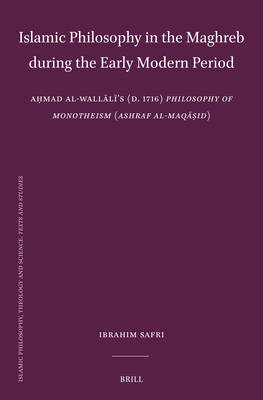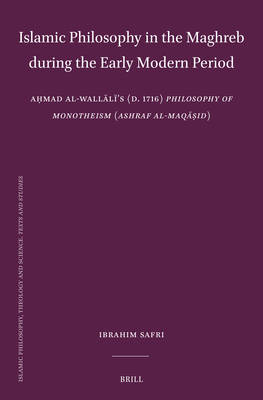
- Afhalen na 1 uur in een winkel met voorraad
- Gratis thuislevering in België vanaf € 30
- Ruim aanbod met 7 miljoen producten
- Afhalen na 1 uur in een winkel met voorraad
- Gratis thuislevering in België vanaf € 30
- Ruim aanbod met 7 miljoen producten
Zoeken
Islamic Philosophy in the Maghreb During the Early Modern Period
Aḥmad Al-Wallālī's (D. 1716) Philosophy of Monotheism (Ashraf Al-Maqāṣid)
Ibrahim Safri
€ 181,95
+ 363 punten
Omschrijving
This monograph endeavors to chart the development of kalām and Islamic philosophy during the early modern Maghreb. The primary focus is on the Moroccan thinker Ibn Yaʿqūb al-Wallālī (d. 1716) and his text Ashraf al-Maqāṣid fī Sharḥ al-Maqāṣid. It sheds light on al-Wallālī's contribution to Islamic philosophy by examining his interpretation of some topics in epistemology, metaphysics, and physics. It also involves the reception of al-Rāzī's (d. 1210) and al-Taftāzānī's (d. 1390) works in the Maghreb.
The book attempts to offer a re-evaluation of the prevailing claims in the scholarship that has dominated the region, asserting that the engagement with Islamic philosophy in the Maghreb continued beyond the time of al-Sanūsī (d. 1490).
The book attempts to offer a re-evaluation of the prevailing claims in the scholarship that has dominated the region, asserting that the engagement with Islamic philosophy in the Maghreb continued beyond the time of al-Sanūsī (d. 1490).
Specificaties
Betrokkenen
- Auteur(s):
- Uitgeverij:
Inhoud
- Aantal bladzijden:
- 260
- Taal:
- Engels
- Reeks:
- Reeksnummer:
- nr. 131
Eigenschappen
- Productcode (EAN):
- 9789004699199
- Verschijningsdatum:
- 18/09/2025
- Uitvoering:
- Hardcover
- Formaat:
- Genaaid
- Afmetingen:
- 155 mm x 235 mm
- Gewicht:
- 539 g

Alleen bij Standaard Boekhandel
+ 363 punten op je klantenkaart van Standaard Boekhandel
Beoordelingen
We publiceren alleen reviews die voldoen aan de voorwaarden voor reviews. Bekijk onze voorwaarden voor reviews.








